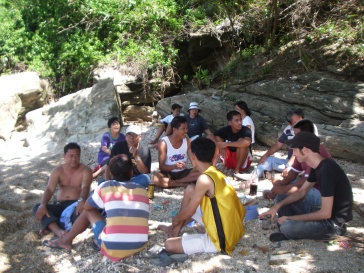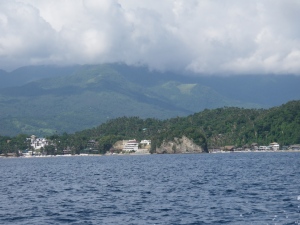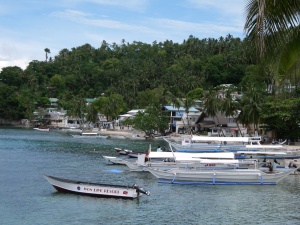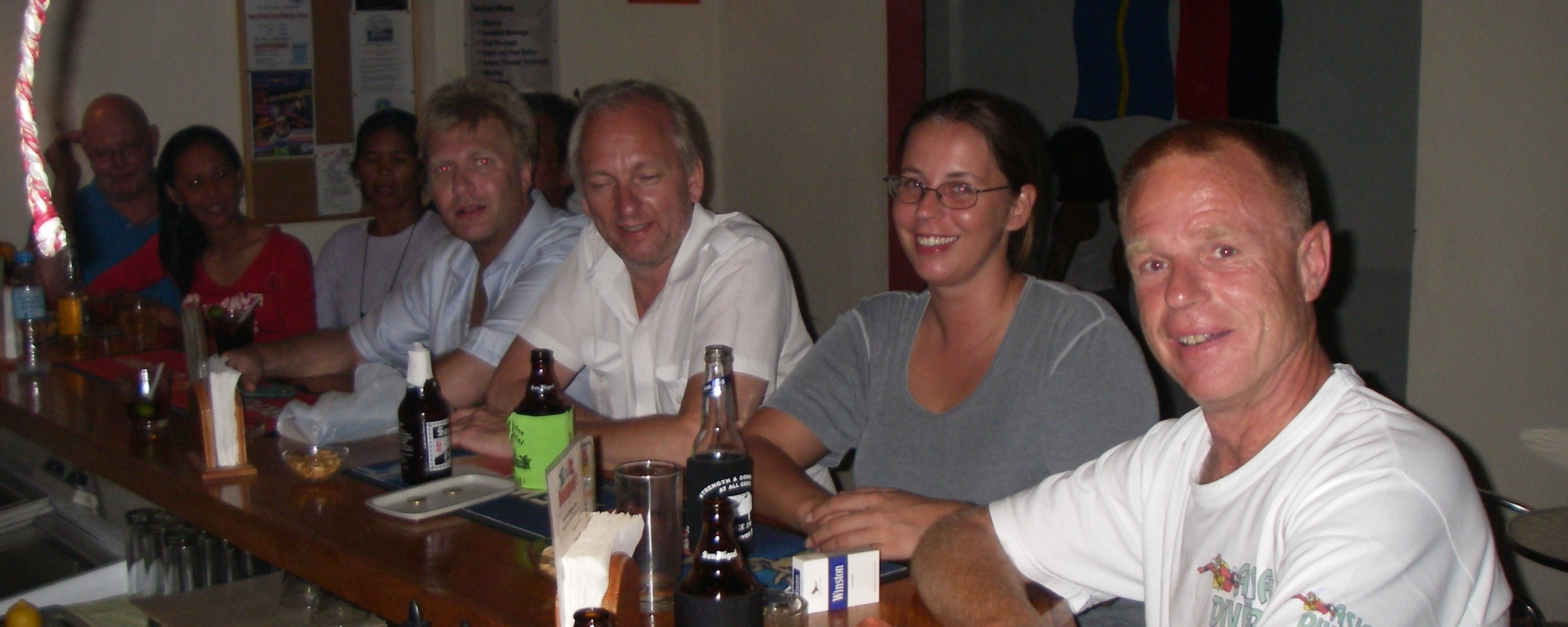By Mari-Elina Ekoluoma
I have on many occasions felt a need to ponder upon the tension between the concepts of “work” and “leisure”. This is certainly not something unique to me as a person, or even anthropologists in general, but these ponderings became poignant while I was doing ethnographic fieldwork in Sabang, a tourism town in the Philippines. This is a town popular mainly among white men from Europe, Australia and, to a lesser degree, the USA, for commercial sex and scuba diving in a beach site in the tropics. The issue of making a distinction between “work” and “leisure” becomes perhaps of acute concern when you are directly “working” with “leisure”.

Like most anthropologists I combined various types of interviews with observations and participations in tourism-related events, and in more mundane everyday activities. Sabang is a small town of approximately 5 000 inhabitants, and its economy revolves almost entirely around tourism. Tourism is in one way or another part of most happenings and social interactions in Sabang.
A part of my strategy to contact women working in the commercial sex scene, as well as the Western tourists and those foreigners who have settled there permanently (expats) was to socialize in the various go-go bars, pubs and restaurants. I was a visible and socially active white woman in Sabang’s nightlife, an environment not associated with the concept of “work”, but much so with “leisure”. This is definitely so in the view of my foreign informants, but not to my Filipino ones, who did indeed work in the tourism industry. For most of my foreign informants, my daytime activities, such as doing more formal interviews, observing and participating in various kinds of tourism-related work, or gathering statistical data at the Municipal Hall were not visible or known.
Seeing me out on the town at night chatting up tourists and sex workers was for some of my foreign informants a bit of an eyesore, and some reacted to the fact that the Swedish government paid me to do what they had worked hard to be able to afford to do. On a couple of occasions I was ridiculed for spending taxpayers’ money on what they saw as nonsense. One British expat would often ask me: “Still on government grants?” Despite him knowing that I was doing field studies for a PhD in anthropology, he was provoked by the fact that I was there not as a tourist but as a researcher. For some other informants I looked and behaved like a tourist, and the “work” part of my presence in Sabang was more difficult to grasp.
I’m Not a Tourist – I’m an Anthropologist
Anthropologists have a history of being ambivalent towards tourists and tourism. It was not until the late 1960s and 1970s, when mass tourism had become a more widespread phenomenon in the West, that we started to acknowledge it. Anthropologists largely saw tourists and other foreigners as a nuisance when studying one’s respective fields. This ambivalence has in some respects remained, and at least some anthropologists seem to fear being identified by their informants as “tourists”.
At a tourism conference, some ten years ago, I met a fellow PhD student doing the same kind of fieldwork as I was doing in Sabang, minus the commercial sex. She told me how she was bothered by the fact that her informants thought she was there on vacation, and that she had repeatedly tried to explain to them that she was there working, She was doing research, and was not a tourist. I can see the point of wanting one’s informants to be aware of one’s purpose of stay at the field site, in order for them to be able to make an informed decision to divulge information. However, I got the distinct impression she was mostly bothered by being identified as a “tourist” enjoying leisure time. She wanted to distinguish herself as being an anthropologist, a researcher at work, and not a tourist.
The “tourist” has often been described in anthropological works as well as in popular culture as lazy and superficial, and at the most “gazing” at local cultures, thus not really interested in how locals “actually” live. In contrast, the ”anthropologist” is expected to be academically productive and participate, not only observe, in whatever is going on in their respective field sites – and many anthropologists seem to feel the need to do so also on their private vacations. I have detected among my fellow anthropologists and tourism researchers a tension regarding a distinction between “work” and “leisure”, a distinction I also struggled with.
An Anthropologist at Work at a Tourist Site
When hanging out in the pubs I got to know how foreigners talk about their experiences of Sabang. With a beer in the hand I had many conversations with mostly white, Western men on a myriad of topics. A recurrent topic was Filipino culture. It was often tiresome to listen to the tirades of expats and tourists, complaining about corruption, people wanting to trick them, the inefficiency of most things. It was often what I saw as ethnographic dynamite. I collected quotes that would embarrass many racists and misogynists around the world (for example: “Filipinas are little brown fucking machines powered with rice”). Furthermore I met people interested in having a conversation about The Philippines, what Filipino culture “is” and how a society “should” work.
I often questioned racist and misogynic opinions held by my foreign informants. This may have caused some to avoid talking to me again. On the other hand, many also expressed that they enjoyed our conversations. This was, rather ironically, also often expressed by putting down Filipinos. They said that they enjoyed talking to an “educated woman”, and explained to me that their wives/girlfriends/sex workers were not much of conversationalists. Even though I regularly disagreed with the views and opinions expressed by some of my foreign informants I frequently had a good time with them. I often enjoyed sitting in bars, meeting and talking with people from all over the Western world, arguing, agreeing and disagreeing.
 As a part of my participant observations and in order to learn more about the limited “alternative” tourist activities aside from commercial sex and scuba diving available in Sabang I went on organized tours to various sights in the vicinity. These trips took me to a viewpoint where I could admire the mountainous terrain meeting the tropical waters, and to a small settlement labeled by the tour organizers as an “indigenous village”. They also brought me to a freshwater waterfall in the rainforest, which had a pond to swim in. After having swum in the salty waters of the sea for months, it was a refreshing experience for me.
As a part of my participant observations and in order to learn more about the limited “alternative” tourist activities aside from commercial sex and scuba diving available in Sabang I went on organized tours to various sights in the vicinity. These trips took me to a viewpoint where I could admire the mountainous terrain meeting the tropical waters, and to a small settlement labeled by the tour organizers as an “indigenous village”. They also brought me to a freshwater waterfall in the rainforest, which had a pond to swim in. After having swum in the salty waters of the sea for months, it was a refreshing experience for me.
Sometimes I was a tourist, such as on these tours, but perhaps with a twist. My training in participant observation urged me to make actual and mental notes of who was there, what they did, what they said, my role in the interaction and so on. This notion of taking notes in whatever situation one find oneself in is, I think, many anthropologists experience in their line of work. Going on these organized excursions to “outside Sabang” were comfortable, enjoyable, and educating for me. They made me ask myself: Is it okay to have fun? Is it okay to “go native” as a researcher by also “becoming a tourist” on these excursions, and in the pubs, having fun talking to people?
In my own my experience of doing field work in a tourist site I did not actually feel that it was much of a problem to be identified as a tourist. I would suppose that other anthropologists also fear being taken for lazy bystanders, though always with a notebook within reach. But I certainly had to jump through many intellectual hoops as I did have issues with whether or not I was indeed working, such as sitting in bars arguing with people. I was “working” but did basically the exact same things as others did in the bars. All anthropologists perhaps wonder whenever they do field work: “This is fun, but is it really work then?”
My partner, Nicklas, who accompanied me on several of my periods of fieldwork, called my attention to the fact that while my neighbors read detective novels on their veranda, I read research articles (and detective novels) on mine, and we all went to the same bars. The only difference was my ear, and maybe how I directed the conversations. I would ask questions, but these questions could be the same questions other foreigners posed to each other. I probably recorded the information in a more systematic way than the average tourist, but most people in Sabang were not able to tell if I was a hard-working anthropologist or a hardly working tourist. If there was a line between the two, it was a fine one. I think many anthropologists recognize the feeling when the initial label “informant” gradually becomes replaced by “friend” instead. For me, “work” and “leisure” also became blurred.
Is a boundary between “work” and “leisure” necessary to maintain when you do fieldwork? Participant observation may be engaging, interesting and fun, something which you find enjoyable in your private, non-professional sides of life. When is participant observation going native?
On my way home from my daytime interviews and observations I often passed by a bar owned by a main informant/friend and I tended to report to the him about what I had done during the day, that I had met the Mayor, informants, or how long my interviews had been. My informant/friend himself didn’t seem to care, he had his own experience of a similar kind of work. I assume I reported my activities to him in order for me to feel that at least one foreigner in Sabang would know that I “actually” worked. I thus also felt an urge to justify my presence in Sabang as “work”, at least to one of my informants/friends.
Nicklas wasn’t too worried about my “work status” and he encouraged me to: “go for it, go native” as a tourist, and he didn’t put any value in the distinction between “work” and “leisure”.
Anthropologists are Also Tourists Sometimes
A question that can be posed is if anthropologists have an obligation to observe, interpret and understand whenever they travel? Though, people that are not anthropologists may be interested in cultures, peoples, behaviors and contexts just as anthropologists can be interested in spending their vacation without giving the local community any further thought. But, can you shut down your interest just because you’re on the road? Can you be a Swedish police officer in charge of traffic and not notice all the traffic violations taking place in everyday traffic in Manila? Can you ever ignore your preferences, interests, education or training when you travel, or even in your private life? If you can’t do it in your daily life, how could anyone expect you to do it when you’re traveling?
be interested in cultures, peoples, behaviors and contexts just as anthropologists can be interested in spending their vacation without giving the local community any further thought. But, can you shut down your interest just because you’re on the road? Can you be a Swedish police officer in charge of traffic and not notice all the traffic violations taking place in everyday traffic in Manila? Can you ever ignore your preferences, interests, education or training when you travel, or even in your private life? If you can’t do it in your daily life, how could anyone expect you to do it when you’re traveling?
I happen to be interested in travel practices, why people chose to go where they go, and what they do when they’re there, and why. To me it’s a fascinating topic, and my interest is fueled by travel and tourism, my own personal experiences of it as well as others’. And from the viewpoint of my work, traveling includes sex tourism involving men from Western countries to a small town in the Philippines.
Tourism Matters
Tourism is a massive global phenomenon, involving a massive amount of people and a massive amount of money. In the UNWTO Tourism Highlights 2016 Edition, the World Tourism Organization estimated that in 2015 the worldwide number of international tourist arrivals reached 1.2 billion, and the same tourism was calculated to be generating a staggering USD 1.5 trillion. It’s a lot, almost beyond comprehension. The Philippines received approximately 5.4 million tourists the same year, which was a new record. France, for a comparison received 85 million tourists the same year. This makes not only tourism an urgent issue for anthropologists to try to grasp academically, but it also makes it an issue that many anthropologists have to deal with, irrespectively of their fields of interest.
There is thus no doubt that tourism is a significant part of many millions, or more accurately, billions of peoples’ lives. It is absolutely so in my life, professionally and in other aspects of my traveling. When working on my PhD thesis and living in Sabang I often asked myself the question: was I working hard or hardly working? Now, a few months after having received my Doctorate I can’t give you a straight answer: I did both, sometimes at the same time.
 Mari-Elina Ekoluoma holds a PhD degree in Cultural Anthropology from the University of Uppsala. In march 2017 she defended her thesis Everyday Life in a Philippine Sex Tourism Town, which is available at: http://uu.diva-portal.org/smash/get/diva2:1064095/FULLTEXT01.pdf
Mari-Elina Ekoluoma holds a PhD degree in Cultural Anthropology from the University of Uppsala. In march 2017 she defended her thesis Everyday Life in a Philippine Sex Tourism Town, which is available at: http://uu.diva-portal.org/smash/get/diva2:1064095/FULLTEXT01.pdf
Mari-Elina’s research interests concern tourism anthropology, sex tourism, globalization, gender, and tourism’s effects on local social boundaries and hierarches.
The arguments and positions expressed in this article belong to the author, and do not necessarily represent those of Sveriges antropologförbund.
Would you like to comment on the article? Send an email to the editors.
Vill du kommentera inlägget? Skicka e-post till redaktörerna.

